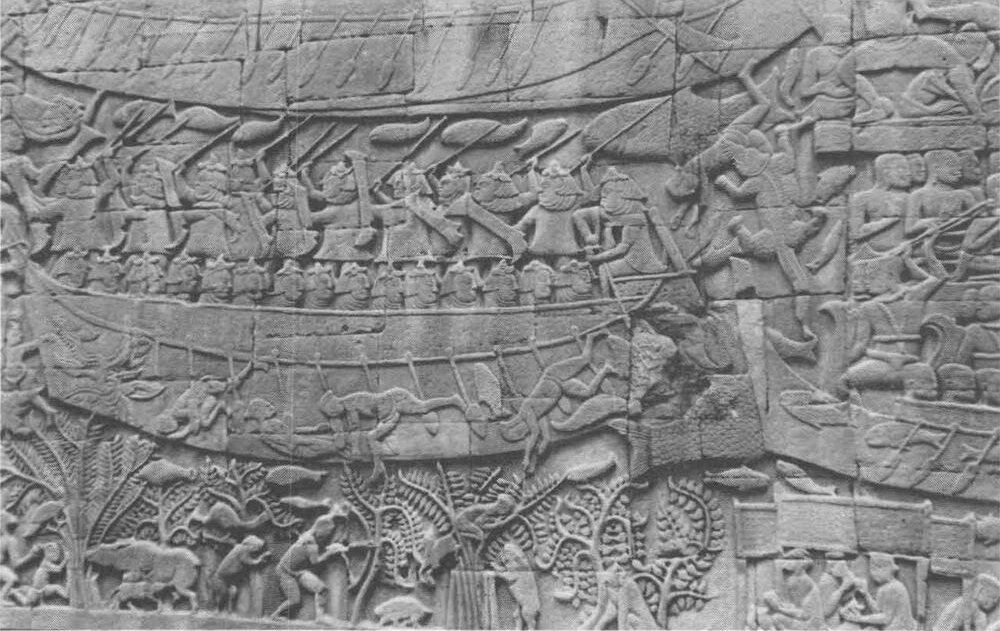Starting from the Roman Empire era, when Arab merchants were dominant in the regional trade, the author takes us to a fascinating journey through times.
How Indian traders got gradually evinced by Javanese merchants, especially in the spice trade with the emergence of products coming from Borneo and the Spice Islands, how Malay sailors played a major role in the regional exchanges, and how the Khmer Empire viewed the local power shift with the rising intercontinental trade: here are some of the many avenues this reference study opens to researchers.
Among the author’s remarks, we’ll note:
Late urbanization in Southeast Asia
The study of Southeast Asia’s history is problematical in that the region’s archaeological remains demonstrate the early development of complex and populous civilizations, but these civilizations produced few settlements that can be called urban centers in the modern sense until the post-1400 era. Discoveries at Ban Chiang and other northeast Thailand sites show some of mankind’s earliest bronze metallurgy and developed rice agriculture, but the evolution of Southeast Asian state systems did not take place until the first centuries of the Christian era. Sufficient technology (e.g., the domestication of animals, rice cultivation, metalwork, pottery manufacture, ship construction, and long-distance navigational skills) were available for the emergence of an Angkor or Majapahit in the second millennium B.C., but such development did not occur. When states did begin to come into existence between the third and sixth centuries A.D. they were unevenly distributed, and rather than evolving their own distinctly Southeast Asian cultural traditions, these states were largely influenced by alien ideas and models.
The Devadravya
Influenced by L. A. Sedov’s work, the author see the Khmer temples as “economic centers”, and refers to Dominique Soutif’s study of Khmer inscriptions to discuss the management of the “biens du dieu’ (devadravya), “god’s possession.” Those, according to the author, “étaient avant tout destinés à faciliter le fonctionnement cultuel des sanctuaires. Pourtant, il nous semble qu’ils doivent également être considérés comme le patrimoine « financier » de ces temples, qui pouvait éventuellement être utilisé à des fins « profanes », notamment dans le cadre de transactions.” [“were primarily intended to facilitate the religious functioning of the sanctuaries. However, it seems to us that they must also be considered as the “financial” heritage of these temples, which could possibly be used for “profane” purposes, particularly in the context of transactions.”
He also quotes from Eleanor Moron, “Configurations of Time and Space at Angkor Wat,” Studies in Indo- Asian Art and Culture 5 (1977): 217 – 267: “In Indian cosmology the kṛta yuga was followed by the age of decay (treta yuga), the age of dangerous balance between perfection and imperfection when spiritual perfection was lost (dvāpara yuga), and then the age of strife (kali yuga), which would be followed by a new kṛta yuga as the cycle repeated.”
The Devaraja
Sticking to the old explanation of Cambodian devarāja as worship of the “god-king”, the author puts forward that
Worship of Śiva in Cambodia became formalized in the devarāja (“god-king”) cult of Jayavarman II (770 – 834), which was based on a mountaintop that became the site of his realm’s principal temple at the center of the royal capital. In the Brahmanical concept of the universe, a circular central continent, Jambudvīpa, was surrounded by seven oceans and continents. In the center of this continent was Mount Meru, around which the sun, the moon, and the stars revolved. On its summit was the city of the gods, where Indra, the “Lord of Heaven,” reigned. On the slopes of Mount Meru was the lowest of paradises (Lokapāla) where the “Guardians of the World” resided. Jayavarman II accordingly centered the cult of the devarāja at his capital city of Hariharālaya, south of Angkor on the edge of the Great Lake (Tonle Sap) in central Cambodia, on the summit of “Mount Mahendra,” the Khmer equivalent of Mount Meru.
ADB Input: In his paper on the Tin Route connecting Southeast Asia with the Middle East, Srini Kalyanaraman, a specialist in Sarasvati civilization, notes: “A gold medallion of Marcus Aurelius’ predecessor Antoninus Pius dated 152 CE has been unearthed at Oc Eo, the main port of Funan in southern Vietnam[-Cambodia], which flourished between the 1st and 6th centuries — especially after strife disrupted caravans across central Asia in the 2nd-3rd centuries. The alternative land-sea route involved maritime sections from the Middle East to northwest India, across the Bay of Bengal to the Isthmus of Kra, across the Gulf of Thailand to Funan, and from Funan to China. Other 2nd-3rd finds at Oc Eo include Roman coins, Indian seals, and jewellery. At around the same time, a commercial centre developed at Ko-ying in the Sunda Straits; Malay seamen brought spices and forest products to Funan.”


